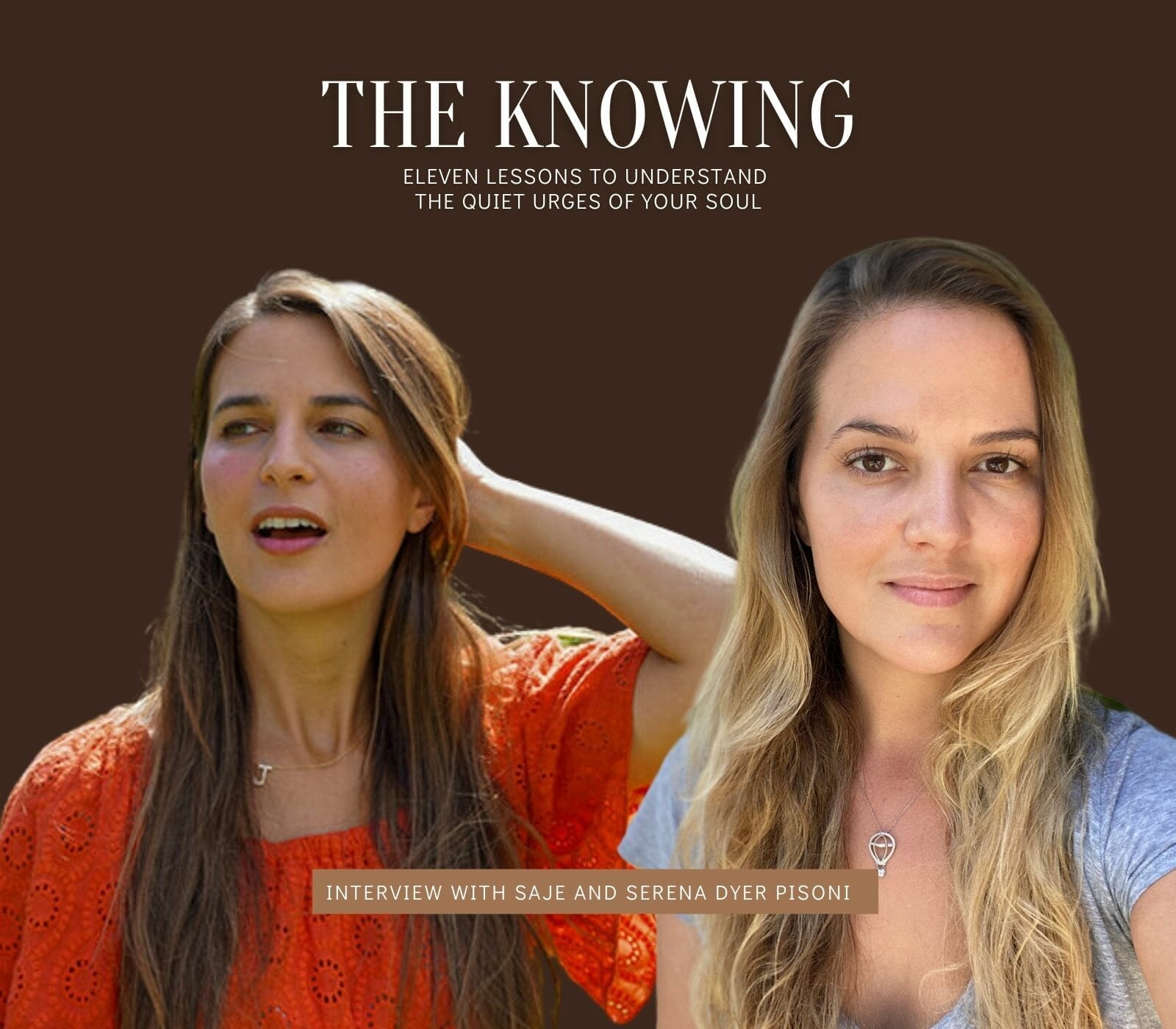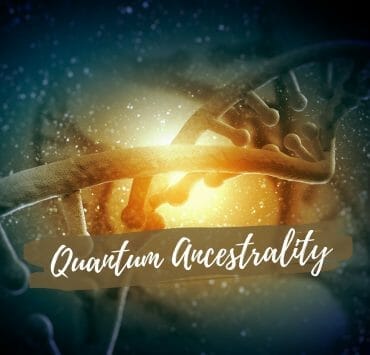Serena Dyer and Saje Dyer: The Knowing

Serena Dyer Pisoni: I would say for me that the Geometry of Forgiveness chapter has really stayed with me probably the most. One because losing a child and writing about that, my stepson and writing about that was obviously very painful and freeing at the same time, but it was through the process of understanding that I had to forgive myself for all of the little things as a stepmom that when he died, I made him the big thing. So, I focused on all of the times I had made a fight or picked an argument over something minor.
All of the mistakes I had made, all of the grievances I’d held onto. They all went out the window, and all I wished I could have done was to love him more and to have made him feel my love because when my dad passed away, I had no regrets. I had no pain in terms of guilt or shame. Even though I desperately wanted him back, it was a very different type of grief than losing a 19-year-old in an accident. I had many mistakes, I mean tons of mistakes that I had made and regrets, and I felt so strongly that I would keep myself stuck in shame and guilt if I did not offer myself Forgiveness.
I knew Mason, my stepson, was offering to me. I knew it because he came to me in a dream, and it was an actual visitation. Your readers are probably more spiritually inclined to believe that we can have visitations from our loved ones. But, still, for somebody who’s a skeptic, I couldn’t say that it was him. But it was real. I touched him, and we connected in a way that I knew was real.
In that dream, I asked him if he forgave me for all of the tiny, dumb, mean things I had done in being his stepmom. He laughed and said, of course. I asked him if he loved me, and he again laughed and again said yes. I said do you know that I love you? And he told me, yes, and I knew that he was telling me that I was at a crossroads. I could choose guilt and shame for the rest of my life. I could marinate in that, or I could choose love and Forgiveness for myself. I decided that because I knew that where Mason was and where I was going was a place where that was the only real option.
Our dad used to quote Mark Twain, who said, ForgivenessForgiveness is the fragrance that the violet sheds on the heel that has crushed it. I think that ForgivenessForgiveness for others and ourselves in the 5 stages of grief needs to be the 6th: forgiving yourself. To go back to the love, the love you deserve to feel, and the love that you deserve to carry with you, not the shame, not the guilt. You don’t deserve it.
Saje Dyer: There’s a story my dad used to share, and when I was with him, I was with him for the 3 weeks before he passed away in Australia and New Zealand. He was on a speaking tour, and he told that story at almost every talk he gave. So hence, it was really fresh in my mind when he passed away because he passed away about 48 hours after we got back from that trip.
The story is simple, and it’s the story of a man whose son is at war, in battle, and he gets a knock on his door one morning and is told the terrible news that his son passed away in action. So that night, he goes into the town, and he goes to a party and is dancing and having fun.
One of the neighbors who knows all the neighbors—it’s a small town. They know what had happened and what he had just found out that morning, so one of them goes up to him and says, “I don’t understand how you could be out dancing when you just learned that your son passed away.” So he said, “Sooner or later, I’m going to have to move on from this, or it’s going to kill me, and I’m just choosing sooner.”
It’s a metaphor, and it doesn’t mean that you should go dancing the night that your son dies and that you should be able to move on in the snap of a finger. It’s just permission to choose sooner in life in any circumstance. There’s no set schedule or guidelines for how long you have to stay stuck in any sort of emotion, whether it’s a job loss or a death, or a breakup. You can always choose sooner, and it might go back the other way, but you can choose it again. So for me, it was just permission to feel joy even though I was still grieving. There wasn’t any prescription for how long I had to stay stuck.
My dad always said you’re only stuck if you choose to be. It’s always a choice. If you’re finding yourself feeling stuck. Look into how you’re participating in that and start choosing other thoughts and actions that help you get unstuck because it’s you.
One thing our parents did was instill in us responsible for our lives. You’re not the victim, and it’s an empowering place to live from. You have to take responsibility for your life, for what you bring into your life, and for how you respond to it.
Sandie Sedgbeer: Absolutely. The book is full of many stories, and they’re all fascinating. There are two that I would’ve liked to talk about, but we don’t have time. Saje’s dream a few nights before your father’s public memorial service and the meaning of the day of his leaving the planet. Please share one story, one memory of your father with your children. What would it be?
Serena Dyer Pisoni: I grew up understanding what it meant to have dharma and allow nothing to get in the way of that. Nothing. Growing up in a team, both of my parents showed what they felt they came here to do. For my mom, it was being a mother, and for my dad, it was being a writer, speaker, and teacher. They didn’t say to us, go follow our dreams while they had simultaneously given up on their own. They played the music that they came here to play without apology. On some level, witnessing that gave me subconscious permission to do the same.
As children, what our parents are doing is so loud that we cannot hear what they’re saying. I didn’t have to get told that I was worthy of my own dharma and following my dreams. It was demonstrated for me, and by God, I hope that I can do the same for my children. They see a mother going out there and doing what she feels called to do, even if that means having to miss things sometimes or not being able to go to every little thing, that I’m doing something bigger than me. Bigger than them, and they, I pray, will feel the same permission to honor their own dharma as well.
Saje Dyer: Our dad used to always quote a poem by Kahlil Gibran. Your children are not your children. They are the sons and daughters of life’s longing for itself.
They come through you, but not for you. It goes on, but I like to remember those lines when I think of parenting my own children. My children are not for me. They came through me. My parents embodied that through their upbringing of us every single day. We were allowed to be who we wanted to be, and it’s such freedom, and I want to give that to my children.
Sandie Sedgbeer: Perfect. Saje Dyer, Serena Dyer Pisoni, thank you. The Knowing: Eleven Lessons to Understand the Quiet Urges of Your Soul is published by Sounds True and for more information about Saje and Serena, you can go to Serenadyer.com and Sajedyer.com
Click HERE to Connect with your Daily Horoscope on OMTimes!
Visit Our Astrology Store for Personalized Reports
OMTimes is the first and only Spiritually Conscious Magazine. Follow Us On Facebook, Twitter, Instagram, Linkedin, Pinterest, and Youtube
A veteran broadcaster, author, and media consultant, Sandie Sedgbeer brings her incisive interviewing style to a brand new series of radio programs, What Is Going OM on OMTimes Radio, showcasing the world’s leading thinkers, scientists, authors, educators and parenting experts whose ideas are at the cutting edge. A professional journalist who cut her teeth in the ultra-competitive world of British newspapers and magazines, Sandie has interviewed a wide range of personalities from authors, scientists, celebrities, spiritual teachers, and politicians.





